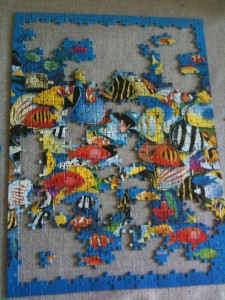 This is what my dining room table looks like. Well, part of it. I’m not posting a picture of the whole thing with the papers on one end and little puzzle pieces everywhere, just in case my mother-in-law checks this blog. (Not that the mess would come as any great shock to her.)
This is what my dining room table looks like. Well, part of it. I’m not posting a picture of the whole thing with the papers on one end and little puzzle pieces everywhere, just in case my mother-in-law checks this blog. (Not that the mess would come as any great shock to her.)
Today was a beautiful, bright, sunny day. And my daughter was in school after a busy weekend. It would have been a great day to dive right into work, or at the very least take the dog for a walk and enjoy the weather. So of course, I got drawn into puzzle-land.
Puzzle-land is interesting. Sometimes you look at the pieces with a sort of soft focus, and the right one just seems to jump into your hand. And you place it without hesitation, only half aware that of why it belongs where it does. It just fits, that’s all, and your fingers knew it would without even consulting your conscious brain.
Sometimes you get all analytical. You think, “I need a horizontal piece, and it has to have a bit of yellow in the corner.” And you scan the unused pieces one by one, and maybe sort them into like colour groupings, until you find that bit of yellow.
I like the soft focus times best. That’s when it feels like magic.
It happens with writing, too. Sometimes you just wake up knowing something about a character — not something you had wondered about, particularly, but something that will add. Something important and irrevocable.
Or sometimes you’re folding laundry when the great Story Gods draw a lightbulb over your head and suddenly you see how the plot needs to unfold. Gotta love those Story Gods, especially when they’re feeling generous.
But sometimes they’re not. Sometimes you have to sit back and stare at your manuscript and look for that piece with the bit of yellow on the corner. It’s not as magical, piecing things together that way, but it works. And that’s okay. You’re piecing the story together, and however you need to get there, you will. You can fix it later.
Those soft focus moments don’t usually come when I’m staring at the screen. They come when I’m doing something else. Walking is good. Highway driving’s even better, because then there’s no easy way to get the idea down before it escapes, and the Story Gods think that’s funny. There are ways to trick them, though. I say the idea aloud — that helps, even without a tape recorder. Or I switch my watch from my left wrist to my right, and that reminds me that there’s something I want to remember, and that usually does the trick.
(Or if my daughter’s in the car, I tell her, and she asks why. And then I have to try to explain it and justify it. And she convinces me that it wasn’t much of an idea after all, just by the quality of her silence. An eight-year-old is capable of very communicative silences.
Sometimes it’s better if my daughter isn’t in the car.)
However you work your way into them, the soft-focus times when the ideas flow easily and snap into place are wonderful. Cherish them. The ideas that come that way… let’s just say they tend to have a higher success rates than the ones I scramble for.
They fit. And the story picture starts to form.

Nicely said Erin.
While reading, I thought that life itself is one big puzzle, and we are constantly searching for the right peace (with the bit of yellow in the corner).
Also, love your “don’t forget” methods. 🙂
Kind regards.
Thanks Vladimir! You might be right about life being a puzzle — I do like the idea of a “peace” with a bit of yellow in the corner. 😉